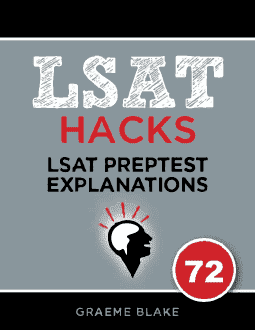DISCUSSION: Remember, the right answer is something that happens in both passages. Two of the wrong answers happen in one passage but not both. You should always find line references to justify the right answer, otherwise you risk fooling yourself.
___________
- Shifting your ground means you change your argument once someone proves your first argument was wrong. Passage A does imply this, on lines 9-11. But passage B doesn’t make a similar accusation.
- The author of passage A cites the example of Estonia. The author of passage B doesn’t cite any real world examples.
- Neither passage uses analogies. An analogy is when you use one situation to make an argument about a similar situation. Like if I compared athletic training to LSAT prep: you need to track your progress in both sports and the LSAT. That’s an analogy between the two subjects.
- A rhetorical question is one that is not meant to be answered. Passage B uses a rhetorical question in lines 50-54, but passage A doesn’t even have a question mark.
- CORRECT. In passage A, see lines 15-17. The second paragraph is the alleged misunderstanding, and paragraph 3 corrects this: it is possible for flat tax systems to tax the rich as much as progressive systems do.
In passage B, see lines 30-39. The author corrects the misunderstanding that you can lose money by moving to a higher tax bracket.


Seems to me that Passage A does suggest that the opponents have shifted their ground (from “flat taxes are just not practical in the real world” to “flat taxes are unfair”). But Passage B does not make a similar suggestion, so A is not the credited response.
Thanks, you’re right. I edited choice A to fix that.